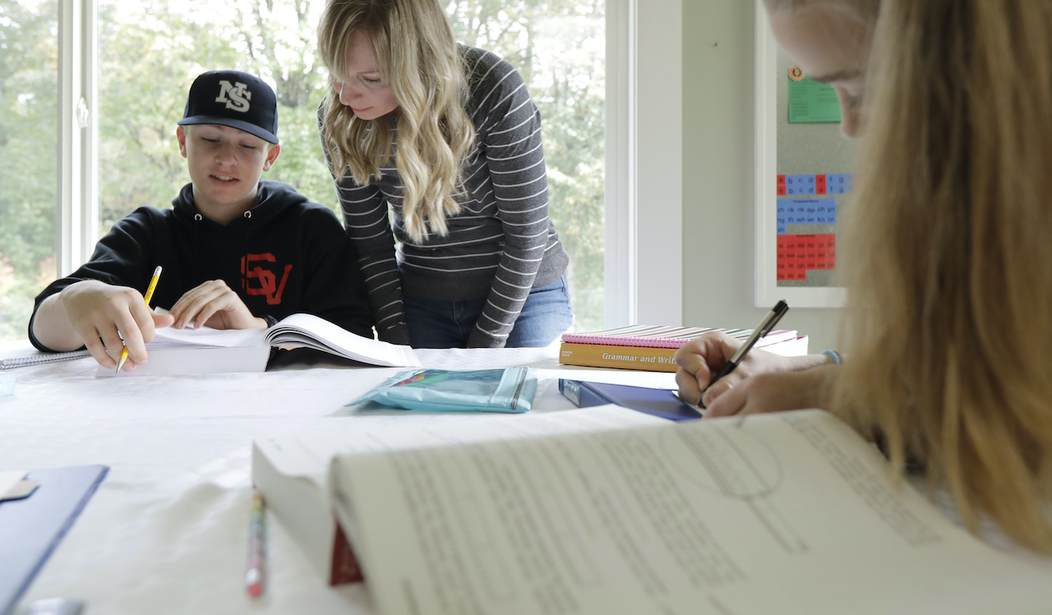Homeschooling has gone mainstream. In less than a generation, teaching children in the home has gone from a choice made by religious parents to the fastest-growing segment of educational choice in America.
"In the 2024-2025 school year, homeschooling continued to grow across the United States, increasing at an average rate of 5.4%," writes Angela Watson in the Johns Hopkins University School of Education's Homeschool Hub. "This is nearly three times the pre-pandemic homeschooling growth rate of around 2%," she added.
A third of the states that report homeschooling figures claim the highest homeschooling numbers ever, surpassing even numbers reached during the pandemic. That's the most surprising aspect of the boom in homeschooling.
"This isn't a pandemic hangover; it's a fundamental shift in how American families are thinking about education," comments Watson.
Even in a deep blue state like Massachusetts, where teachers' unions hold tremendous sway over politics and education policy, homeschooling is thriving.
"Five years after the pandemic's onset, there has been a substantial shift away from public schools and toward non-public options," Boston University's Joshua Goodman and Abigail Francis wrote last summer for Education Next.
The authors found that as the number of school-age children declined by 2.6%, there was "a 4.2 percent decline in local public-school enrollment, a 0.7 decline in private-school enrollment, and a 56 percent increase in homeschooling," writes Reason.com's J.D. Tuccille. Charter school enrollment was limited by statute, but one can imagine what the numbers would be if the state and the unions got their boot off the neck of charter schools.
In research published in August, Dylan Council, Sofoklis Goulas, and Faidra Monachou of the Brookings Institution found similar results at the national level. "The COVID-19 pandemic forced millions of families to rethink where and how their children learn, and the effects continue to reshape American K-12 education," they observed. If "parents keep choosing alternatives at the pace observed since 2020, traditional public schools could lose as many as 8.5 million students, shrinking from 43.06 million in 2023-24 to as few as 34.57 million by mid-century."
It's not difficult to figure out what pushes parents to seek out alternatives and to flock to the various forms of DIY education grouped under the homeschooling heading.
"The fraction of parents saying K-12 education is heading in the wrong direction was fairly stable from 2019 to 2022 but rose in 2023 and then again in 2024 to its highest level in a decade, suggesting continuing or even growing frustration with schools," commented Goodman and Francis.
In the past, public schools responded to challenges to their educational monopoly by declaring war on any threat to their primacy. Some states still have very restrictive rules governing homeschooling, making it even more of a travail for parents to educate their child in a manner that they approve of.
According to the Johns Hopkins Institute, using census data, about 2.8% of children were homeschooled in 2019. That number is now close to 6% and continues to climb.
Pew Research surveyed parents about why they pulled their child out of public school and decided to homeschool.
The most common reason cited was concern about the school environment, including safety, drug exposure, or negative peer pressure, with 83 percent of parents saying it was a factor. Dissatisfaction with academic instruction at schools was also a top concern, cited by 72 percent. About half of parents said the desire to provide religious instruction and to provide a nontraditional approach to their children’s education were factors.
Education became a culture war battleground in the wake of the pandemic, with conservatives pushing to eliminate what they viewed as “wokeness” in the classroom, and several Republican-led states passing laws limiting what schools can teach about race and sexuality.
Not all states release data on homeschooling, and some states don't track homeschooling. It's a safe bet that the 6% of families homeschooling their children, as reported by Pew, is an undercount.
What will the public schools do in response? Rather than try to compete, they will no doubt put more roadblocks in the way of parents looking to send their children to charter schools or homeschool them. It's a shame because they're only hurting the children and families who want the best for their kids.
PJ Media has been a source of independent news for more than 20 years. Unafraid to take on the critical issues that the national media won't cover, our team of writers and editors works tirelessly to bring stories that inform and make readers think about America and its place in the world.
Help us continue to report the news you care about. Use promo code FIGHT to get 60% off your VIP membership.










Join the conversation as a VIP Member